|
|
|
Sort Order |
|
|
|
Items / Page
|
|
|
|
|
|
|
| Srl | Item |
| 1 |
ID:
193138
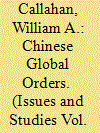

|
|
|
|
|
| Summary/Abstract |
While many use rational IR theory to explain Chinese foreign policy behavior, this paper follows global IR to employ interpretivist theory to examine how Chinese elites understand their country’s role in the world. In particular, it explores the Chinese global order ideas of socialism, tradition, and nation through a comparative analysis of how they work in China–Russia relations, especially after China’s 20th Communist Party Congress in 2022. The first section presents a critical analysis of the realist understanding of the China–Russia–U.S. strategic triangle. It argues that the socialist concept of “united front work” better explains Chinese (and Russian) policy in terms of short-term “tactical triangles.” To probe China’s long-term global order ideas, the second section explores narratives of tradition to examine the concentric circles model of global order seen in Chinese tianxia and Russian Eurasianism. To understand these competing Russocentric and Sinocentric global orders, the third section explores how each country’s official historiography highlights narratives of the nation and especially how national rejuvenation requires correcting the “national humiliation” of lost territories. Rather than see these narratives in a linear chronological history — i.e., from tradition to socialism to nationalism — this paper considers how they overlap in socialism, tradition, and nation, a non-linear dynamic triad of global order ideas. It concludes first that further research is necessary to examine the interrelation of these three narratives: while nation and tradition are often employed to support the overarching narrative of socialism in recent years, this could certainly change. The conclusion then argues that while these narratives may be coherent theoretically, they have not been very successful in achieving Beijing and Moscow’s foreign policy objectives.
|
|
|
|
|
|
|
|
|
|
|
|
|
|
|
|
| 2 |
ID:
141730
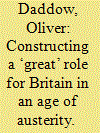

|
|
|
|
|
| Summary/Abstract |
This article interprets the ideational underpinnings of the British Conservative–Liberal coalition government’s foreign policy from 2010 to 2015. It uses qualitative discourse analysis of speeches, statements and policy documents to unpack the traditions of foreign policy thought which informed some of the key foreign policy practices of the coalition government. The analysis centres on the British identity constructed by liberal Conservatives, and the values and interests flowing from this baseline identity that the government’s foreign policy sought to express through its foreign policy. Liberal Conservative foreign policy is argued to have been an attempt to come to terms with the limits on Britain’s international agency in the face of three major foreign policy dilemmas: the legacy of the New Labour years, dramatically reduced economic resources in the ‘age of austerity’ and an increasingly restricted capacity for Britain to exercise ideational entrepreneurship in the international community. The article substantiates the claim in the extant literature that liberal Conservatism significantly adapted but did not restructure an established British foreign policy tradition of merging values and interests in complex ways.
|
|
|
|
|
|
|
|
|
|
|
|
|
|
|
|
| 3 |
ID:
141729
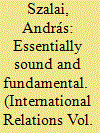

|
|
|
|
|
| Summary/Abstract |
Faced with the strategic uncertainties of the early nuclear age, the US Air Force (USAF) turned to civilian experts (defense rationalists) for help. Although the two communities shared the perception that science-based policies were required, the marriage of two distinct traditions – military and scientific – was not without conflict. Using an interpretivist approach, this article investigates this problematic reconciliation. It construes the realm of nuclear strategy-making as an interpretive enterprise where a multitude of ideas competed. Experts in this environment influenced policy decisions by rendering their ideas persuasive for their military ‘patrons’ through narrative framing devices. Within this conceptualization, bureaucratic dilemmas faced by the patron offered opportunities for experts to establish metaphorical correspondence between their tradition and the patron’s tradition. Such correspondence then lent ideas legitimacy and encouraged organizational support. As an illustration, an analysis is conducted on the role that hallmark RAND ideas on war limitation played in the so-called ‘counterforce’ debate in the early 1960s. This case suggests that the lasting impact of deterrence ideas had less to do with their correspondence to reality, than with their versatility as carriers of constructed ‘scientific’ and ‘rational’ storylines that gained traction within the USAF.
|
|
|
|
|
|
|
|
|
|
|
|
|
|
|
|
| 4 |
ID:
181535
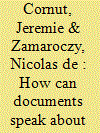

|
|
|
|
|
| Summary/Abstract |
Practice theorists favor interviews and participant observations in their study. Using insights from anthropological works on bureaucratic texts, in this article we develop methodological tools to complement these interpretive methods of data collection. We suggest a way to trace practices by systematically looking through both the content of documents and their form. We probe this approach with an analysis of 408 diplomatic cables sent by the US Embassy in Dar es Salaam, Tanzania in 2005–2009 and subsequently released by Wikileaks. We draw on these documents to tell two related stories about diplomatic practices: the first about epistemic practices and how the cables privilege certain voices and types of knowledge over others, and the second about diplomatic culture, where the cables serve as evidence of the powerful socialization processes that diplomats are subject to. This contributes to International Relations (IR) with a new approach for systematically analyzing written documents to uncover international practices.
|
|
|
|
|
|
|
|
|
|
|
|
|
|
|
|
| 5 |
ID:
141728
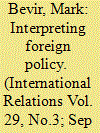

|
|
|
|
|
| Summary/Abstract |
This Special Issue advances an interpretive research programme into Foreign Policy Analysis (FPA) and International Relations by showcasing new work on the study of foreign policy and regional cooperation. This introductory article explains the rationale and contents of the Special Issue in three parts. The opening part explains how the contributions complement the broader study of ideas in FPA and International Relations through a critique of methodological positivism in the social sciences. The second part elaborates the theoretical framework used to cohere the collection, which centres on the study of ‘situated agents’ who, when confronted with policy dilemmas, draw on inherited traditions to inform their foreign policy practices. This is accompanied by a methods case study centring on David Cameron’s European Union referendum strategy, which is used to illustrate the practical ways in which one can conduct interpretivist research into foreign policy. In conclusion, we spell out how the contributors conducted their work to advance the interpretivist research programme.
|
|
|
|
|
|
|
|
|
|
|
|
|
|
|
|
| 6 |
ID:
141734
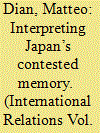

|
|
|
|
|
| Summary/Abstract |
This article applies an interpretive approach to account for the process of definition and contestation over wartime memory in Japan. It first locates the role of memory in interpretive theory, emphasising how beliefs about the past are a crucial component of foreign policy traditions. Second, it highlights how the process of contestation over a country’s memory is fundamentally intertwined with attempts to legitimise or resist key foreign policy decisions in response to contemporaneous dilemmas that force a confrontation with historical traditions. This is illustrated through an analysis of the Yoshida Doctrine’s problematic compromise between conservative and progressive traditions of thought about Japan’s role in the Second World War, beginning with the period of US Occupation, moving through the Cold War years and ending with the death of the Shōwa Emperor in 1989. Finally, it studies the ‘normalisation’ of Japanese foreign policy during the post-Cold War Heisei period, the dilemmas caused by the debate over wartime memory and the effort to achieve reconciliation with other Asian nations. The central argument is that post-war Japanese foreign policy has generally represented an uneasy and evolving compromise between the conservative and progressive traditions.
|
|
|
|
|
|
|
|
|
|
|
|
|
|
|
|
| 7 |
ID:
141733
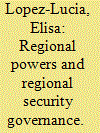

|
|
|
|
|
| Summary/Abstract |
The study of regional powers has become an increasingly prominent part of debates in the academic field of International Relations (IR), particularly regarding their role in creating the conditions for international security. While the IR literature tends to focus on the causal effect of material and ideational factors to explain the policy of regional powers, this article uses an interpretive approach, centring on the study of historical representations. Through a comparative analysis of the foreign policies of Brazil and Nigeria since the 1990s, it argues that a focus on the traditions and dilemmas of regional powers enables a better explanation of their policy, one which illustrates how material factors are refracted through the representations of foreign policy elites in the two countries and expressed in their foreign policy practices as regional powers.
|
|
|
|
|
|
|
|
|
|
|
|
|
|
|
|
| 8 |
ID:
113817


|
|
|
|
|
| Publication |
2012.
|
| Summary/Abstract |
This paper uses Patrick Thaddeus Jackson's monism/dualism distinction to clarify ongoing methodological debates among students of critical terrorism studies (CTS). We map the distinction onto the CTS literature and emphasize the distinctive ontological starting points and the distinctive epistemological frameworks entailed by each perspective. Then we critically engage monistic, or interpretivist, CTS research, especially that of Richard Jackson. We argue for a more methodologically explicit and logically consistent interpretivist CTS and we suggest three important steps that researchers can take to achieve this aim: (i) take an explicit ontological stance; (ii) embrace reflexivity; (iii) conceptualize terrorism as a meaning-making practice.
|
|
|
|
|
|
|
|
|
|
|
|
|
|
|
|
| 9 |
ID:
100199
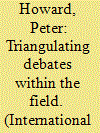

|
|
|
|
|
| Publication |
2010.
|
| Summary/Abstract |
Undergraduate introductory methods courses offer a unique opportunity to bring methodological pluralism to the field by teaching students multiple approaches to research. This article presents one way to organize an introductory undergraduate research methods course. By focusing on central debates between methodological approaches on issues of causality, context, and essentialism, an instructor can introduce positivism, interpretivism, and relationalism as distinct, coherent methodological approaches to research. Depicting these three debates and three approaches graphically on a triangle can illuminate some core methodological debates within the field today. It also illuminates the methodological underpinnings of many of the discipline's theoretical debates.
|
|
|
|
|
|
|
|
|
|
|
|
|
|
|
|
|
|
|
|
|